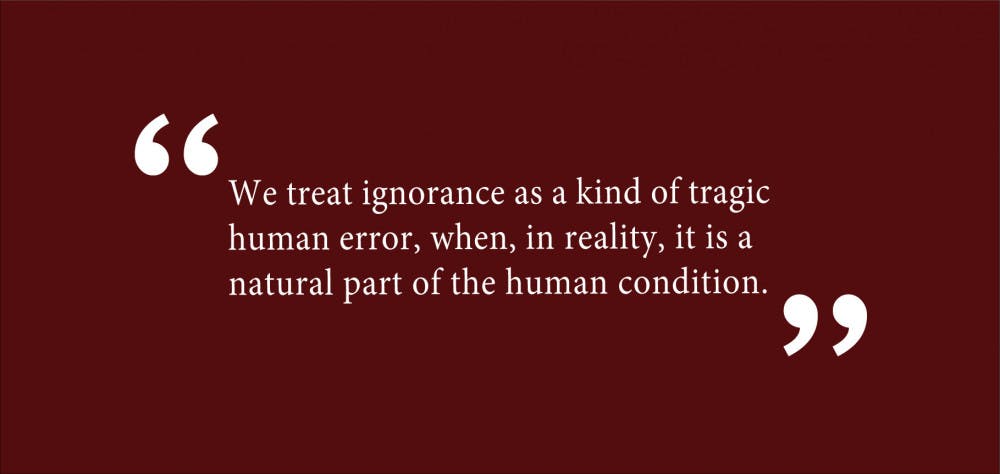I am guilty of it — giving opinions on things I know little about. Most of the time, the stakes are low. I argue with friends about sports teams that I never watch, music that I rarely listen to and shows that I have only ever seen once. My limited knowledge does little to prevent me from crafting oversized arguments. But then again, in most casual conversations, it hardly matters who is really right in the end.
I don’t think I am alone in this behavior. During conversations on unfamiliar topics, we strain for the few dregs of knowledge that we actually possess, trying our best to make a little bit of information seem like a lot.
This tendency to inflate our own knowledge and expertise makes sense. No one likes to be left out of a discussion. No one likes to leave a question unanswered. From a conversational standpoint, saying “I don’t know” is like a shot in the foot that forces the conversant to limp away in another direction. It seems far better to feign comprehension.
Yet, at times, I also fear that we can tread too far down the path of unfounded expertise. Each time we are unwilling to acknowledge our own inexperience, it becomes harder to admit it in the future. But this practice has its own repercussions. For the sake of intellectual clarity and honesty, it is time to embrace the power of saying “I don’t know.”
After all, the stakes aren’t always so low. Conversation is more than just an ephemeral exchange of dialogue. When we talk about issues that we know little about, we may oversimplify them because our understanding is so limited.
For certain topics, nuance is more than just beneficial; it is integral. For example, when discussing politics and policy, we must address multidimensional aspects of our beliefs. If we talk about these issues in imprecise terms, it may be better not to talk at all. Simplistic arguments can delude us, providing easy answers to difficult questions.
This behavior is exacerbated by our culture. From television screens to news pages, we are inundated by a constant deluge of punditry. Everyone in the media seems to be an expert, and so we may place the same expectations on ourselves. On a more personal level, we may just want to appear intelligent, letting empty arguments cover up holes in our own comprehension.
A latent sense of fear underlies it all — a fear of seeming inadequate, of seeming misinformed. We treat ignorance as a kind of tragic human error, when, in reality, it is a natural part of the human condition. And intellectual humility can be challenging. The act of saying “I don’t know” requires us to expose an uncomfortable truth about ourselves — what do we know at all? What do we know about anything?
Obviously, we should not restrict ourselves from all conversation. If absolute knowledge were a prerequisite for having an opinion, I would not be writing for The Herald. I am advocating not for fewer discussions, but only for more honest ones.
Nor do I want us to be apathetic. Saying “I don’t know” will not be a cure-all for poor conversation. Instead, we can admit to ignorance while remembering to ask questions. We can defer the formation of our opinions until a point when we know more. We should not stop seeking knowledge — I simply think we should begin by acknowledging the gaps in our knowledge. If anything, the act of saying “I don’t know” can be a powerful motivator for learning more, so that one day we can reasonably and confidently say, “Here’s what I think.”
So much of our public discourse has become all about dominance. Rarely does anyone want to admit that they are wrong. As a result, intellectual hubris has become ubiquitous. This hubris is made all the worse by our cognitive shortcomings, such as confirmation bias. People love to fixate on all the information that validates their existing beliefs, ignoring all the possible contradictions.
Even the most well-informed people can never obtain complete knowledge. And it takes a considerable amount of bravery and integrity to recognize the finite bounds of what we know. In this way, “I don’t know” becomes less a phrase and more a frame of mind. Certain subjects will always elude our understanding, and it is up to us to recognize when we need to listen rather than to speak.
In short, whether we know a little or a lot about a topic, it is always worth acknowledging the things we do not know. While it is easy to present a facade of competence, it is much harder to reveal our actual incompetence. But in the end, admitting ignorance is the first step toward truly understanding anything, a first step that can be as simple as saying “I don’t know.”
Johnny Ren ’23 can be reached at jiawei_ren@brown.edu. Please send responses to this opinion to letters@browndailyherald.com and op-eds to opinions@browndailyherald.com.





